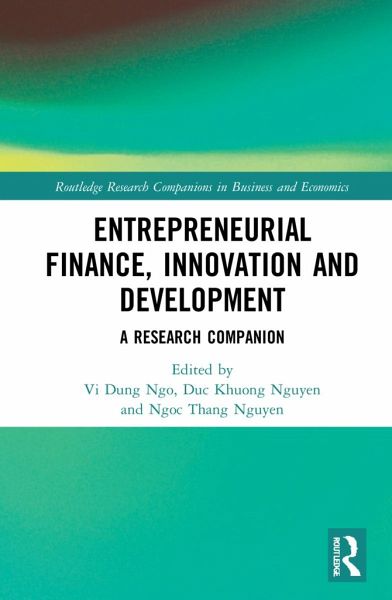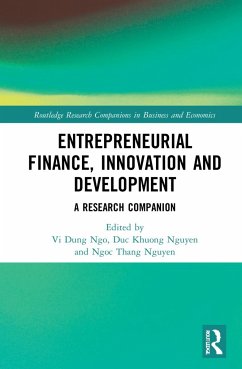
Entrepreneurial Finance, Innovation and Development
A Research Companion
Herausgeber: Ngo, Vi Dung; Nguyen, Ngoc Thang; Nguyen, Duc Khuong
Versandkostenfrei!
Versandfertig in 1-2 Wochen
213,99 €
inkl. MwSt.

PAYBACK Punkte
107 °P sammeln!
Entrepreneurship is now unanimously considered a major engine for socio-economic development, mainly because it creates jobs and innovation. Governments around the world pay special attention to removing entrepreneurial barriers in order to support development via different policies, especially entrepreneurial finance. Developing, emerging and transition economies (DETEs) significantly differ from industrialized countries because of their specific conditions: institutions, infrastructure facilities, and bureaucratic procedures within the administrative system. Thus, firms and their entrepreneu...
Entrepreneurship is now unanimously considered a major engine for socio-economic development, mainly because it creates jobs and innovation. Governments around the world pay special attention to removing entrepreneurial barriers in order to support development via different policies, especially entrepreneurial finance. Developing, emerging and transition economies (DETEs) significantly differ from industrialized countries because of their specific conditions: institutions, infrastructure facilities, and bureaucratic procedures within the administrative system. Thus, firms and their entrepreneurs in and from DETEs may behave differently, particularly in terms of their financial strategies. Therefore, contextualizing is critical to better understand the relationship between entrepreneurial finance, innovation, and development in DETEs. This book provides a systematic and profound understanding of how finance, entrepreneurship, innovation, and their interactions contribute to economic development in DETEs, which cover a large number of countries in Asia, Central and Eastern Europe, Latin America, and Africa. The book mainly includes empirical studies and is divided into four parts. Part A includes four chapters which adopt a multinational approach to examine different sources and types of finance for entrepreneurship and small business in different groups of countries classified as DETEs. Part B also includes four chapters and focuses on entrepreneurial finance in specific countries belonging to the DETEs. Part C goes beyond the business scope of entrepreneurial finance and includes three chapters concerned with the relationship between finance, women's entrepreneurship, and poverty. Part D includes three chapters focusing on the comparison within developing countries as well as between developing and developed countries. This essential and comprehensive resource will find an audience amongst academics, students, educators, and practitioners, as well as policymakers and regulators.












